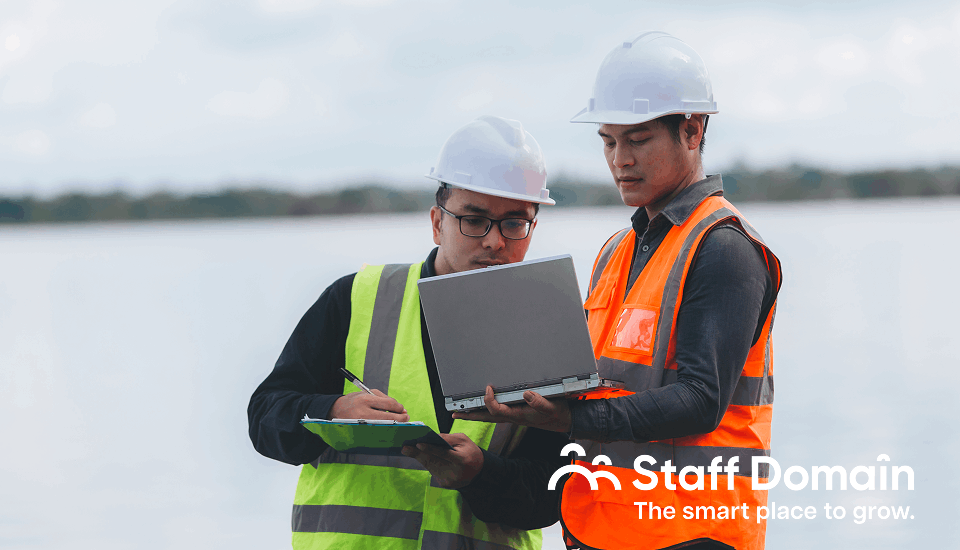Offshore project support is becoming essential in scaling New South Wales’ (NSW) Renewable Energy Zones (REZs). As NSW ramps up its clean energy infrastructure, the demand for skilled talent in Geographic Information System (GIS) analysis, regulatory compliance, and project coordination has surged.
To meet these complex and time-sensitive needs, organisations are turning to offshore teams. These experts help manage data-heavy tasks and streamline project workflows, accelerating delivery while addressing local workforce gaps.
This blog explores how offshore support is helping drive the success of NSW’s REZ rollout, supporting integrated energy generation and storage solutions at scale.
1. Offshore Project Support: Powering NSW’s Renewable Energy Transformation

Offshore project support is helping New South Wales (NSW) scale its Renewable Energy Zones (REZs), which are expected to deliver over 12GW of clean energy. These complex infrastructure projects demand fast, accurate work in areas like data analysis, permitting, and regulatory compliance, tasks well-suited to skilled offshore teams.
By outsourcing roles such as GIS analysts, project coordinators, and compliance specialists, energy companies can reduce pressure on local teams while accelerating timelines. Offshore support enables:
- Faster data processing and documentation
- Improved regulatory reporting and compliance accuracy
- Round-the-clock productivity through global time zone leverage
This strategy mirrors proven models in the infrastructure sector, as explored in Beyond Borders: Strengthening Australia’s Construction Sector Through Offshore Expertise. As NSW pushes for clean energy leadership, offshoring is emerging as a smart, scalable solution.
2. Addressing Data-Heavy Challenges with Offshore GIS and Regulatory Talent

As NSW accelerates its Renewable Energy Zones, the volume of geospatial, environmental, and compliance data has grown exponentially. Processing this information quickly and accurately is critical to keeping projects on schedule, but local capacity is often stretched thin. This is where offshore project support provides a significant edge.
Offshore GIS analysts play a vital role in mapping terrain, evaluating land use, and identifying optimal sites for solar, wind, and battery installations. Their expertise ensures precision in early-stage feasibility studies, reducing costly delays caused by data errors or regulatory setbacks. At the same time, offshore regulatory support staff help manage permits, documentation, and compliance tracking, tasks that require attention to detail and strict adherence to evolving legislation.
Key benefits of offshoring these functions include:
- Faster turnaround on mapping, modelling, and reports
- Access to a broader talent pool with specialised technical skills
- Consistent documentation that aligns with Australian standards
These capabilities are especially valuable in REZs like New England and South-West NSW, where project timelines are tight, and local authorities require detailed submissions within set review windows.
As noted in Offshoring as a Strategic Response to Australia’s Construction Workforce Gaps, tapping into offshore talent isn’t just a cost-saving measure, it’s a way to strengthen resilience and meet growing demand with agility.
3. Offshoring as a Strategic Solution to Workforce and Timeline Constraints
The Workforce Challenge in Renewable Energy
As New South Wales accelerates its rollout of Renewable Energy Zones, the demand for skilled professionals in geospatial analysis, regulatory support, and technical planning is outpacing local supply. These shortages mirror broader workforce constraints across Australia’s infrastructure and construction sectors.
Offshore Project Support: A Proven Strategy
Offshore project support offers a scalable, reliable solution to fill critical skill gaps, especially during high-pressure phases such as:
- Regulatory compliance and permitting
- GIS mapping and environmental modelling
- Progress reporting and technical documentation
Offshoring enables companies to maintain momentum without overburdening local teams.
Real-World Proof: Oceanis and Carrera by Design
- Oceanis: After six months of unsuccessful local hiring, this aquatic design firm partnered with Staff Domain to build a niche offshore team. The result was seamless integration and continued project success despite a competitive hiring market.
- Carrera by Design: Starting with just one drafter, this bespoke interior company scaled to five offshore specialists. Their offshore staff is now embedded into their Sydney operations, improving efficiency while maintaining quality standards.
Why This Works for NSW REZs
Offshore teams are not just stopgaps, they’re strategic assets. They offer:
- Scalable support during peak project periods
- Access to experienced professionals aligned with Australian standards
- Cost efficiency without compromising on technical accuracy
This approach aligns with the needs of REZ developments that require consistent output across multiple disciplines, often under strict time constraints.
Related Insight
For more on addressing labour shortages through offshoring, see:
Offshoring as a Strategic Response to Australia’s Construction Workforce Gaps
The Road Ahead: Offshore Project Support for a Greener NSW
A Scalable Model for Renewable Growth
As New South Wales (NSW) races toward its clean energy targets, the role of offshore project support will only grow more crucial. With Renewable Energy Zones (REZs) requiring years of coordinated planning, development, and maintenance, having access to a flexible, global workforce model sets a solid foundation for long-term success.
Offshore teams are already proving their value across storage integration, GIS modelling, and regulatory workflows. By embedding offshore professionals into project delivery pipelines, energy developers can streamline execution while boosting resilience against workforce shortages, budget constraints, and scheduling bottlenecks.
Digital Coordination and Knowledge Transfer
Offshoring also paves the way for enhanced digital transformation across renewable energy projects. Cloud collaboration tools, project management software, and virtual communication platforms now make it easier than ever to integrate offshore staff without disruption. This setup not only supports faster turnarounds but also builds a digital knowledge base that’s accessible across borders.
Learn how emerging tech tools are reshaping offshore collaboration in our blog on Embracing Digital Transformation: The Impact of AI and Automation in Construction.
A Model Worth Replicating
The renewable sector can borrow proven offshoring strategies from construction and engineering. Just as offshoring helped Oceanis scale specialised aquatic projects and supported Carrera by Design’s expansion without compromising quality, renewable energy developers can apply the same model to REZ rollouts.
As seen in Fuelling the Future of Green Building with Skilled Offshore Specialists, sustainability and offshore support go hand in hand, enabling smarter, greener, and more agile project execution.
Conclusion: Offshore Expertise Empowering NSW’s Clean Energy Future

As New South Wales pushes ahead with its Renewable Energy Zones, the integration of offshore project support has emerged as a strategic advantage, bridging talent shortages, accelerating project delivery, and enabling a smarter, more agile approach to infrastructure development.
By outsourcing specialised roles in GIS, regulatory compliance, and coordination, energy developers can streamline operations while maintaining high standards. This model not only supports immediate project needs but also builds a scalable, future-ready foundation for the state’s clean energy goals.
Whether it’s offshoring talent to deliver solar and wind infrastructure or supporting battery storage rollouts with expert analysis, offshore teams are now a vital part of NSW’s renewable transition.
Staff Domain’s offshore outsourcing solutions connect your business to a highly experienced global talent pool for game-changing results. Effortlessly manage your offshore workforce with our comprehensive compliance, payroll, and HR support, and benefit from fixed, transparent pricing in your local currency. Contact us today or schedule a meeting with our sales team to quickly source the right offshore team for your business.
FAQs About Offshore Project Support
1. What is offshore project support in renewable energy?
It’s the use of overseas professionals to handle data, coordination, and compliance tasks in renewable projects.
2. How does offshore support help NSW’s Renewable Energy Zones?
It speeds up delivery, fills local skill gaps, and ensures 24/7 progress on complex energy projects.
3. What roles are commonly outsourced?
GIS analysts, project coordinators, regulatory support staff, and CAD designers are often outsourced.
4. Is offshore support reliable for regulated industries?
Yes, when managed well, offshore teams meet Australian standards and integrate smoothly with local operations.








